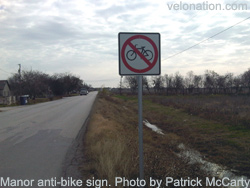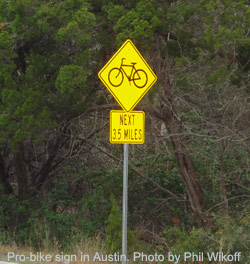 Manor, Texas is an ideal place for cyclists. The town, located 15-miles east of Austin, is surrounded by lush farmland. It’s situated amongst gently rolling hills and riddled with smooth country roads. On my first serious bike ride as a freshman at the University of Texas in 1999, I ventured toward Manor.
Manor, Texas is an ideal place for cyclists. The town, located 15-miles east of Austin, is surrounded by lush farmland. It’s situated amongst gently rolling hills and riddled with smooth country roads. On my first serious bike ride as a freshman at the University of Texas in 1999, I ventured toward Manor.
Around that time the town was home to just over a 1,000 people. Locals stuck an entire arm out the window of their pickup to wave after passing. They waited patiently at the edge of the town’s single lane bridge for cyclists to come through first. Employees exclaimed, “Y’all rode here from Austin!” When we stopped at the store for RC Colas.
But over the years Manor changed. The population grew to nearly 6,000. People no longer seemed surprised at seeing cyclists. The sheriff doled out (not entirely undeserved) tongue-lashings and tickets for rolling stop signs. The one lane bridge turned to four, while other previously perfect roads crumbled under the increasing auto traffic.
Then, two months ago Manor criminalized biking.
A cyclist crashed after hitting a large crack pedaling into town and filed a claim against the city for $250,000. It turned out the cyclist actually crashed outside of Manor’s jurisdiction, and the town wasn’t responsible for the rider’s claim. But Manor took action to mitigate their liability, anyway.
The city council passed an ordinance banning bicycling on the road. A sign, featuring a circled and slashed bike, now greets riders at the city limits. Violators are subject to a $200 fine. While the road ban extends only a quarter of a mile from town, it forces cyclists to make a roughly three-mile detour. The tone the sign projects travels much further: Cyclists no longer welcome.
In all honesty, I rarely pedaled the now banned road. It’s narrow and busy. A number of far nicer alternative routes exist. But like many cyclists in Austin, I took Manor’s bike ban personally. Being told where I cannot ride only makes me want to go there more. Civil disobedience seemed the most logical recourse.
They can’t ticket us all!
Then I talked to Robin Stallings, Executive Director of the Texas Bicycle Coalition (TBC), the state’s primary advocacy group. For over three decades, Stallings has fought for cyclist rights. He urged diplomacy.
“Right now the ban is temporary, lets not make it permanent,” Stallings said.
Manor sits on a long proposed and nearly completed180-mile cycling route, Old Highway 20, linking Austin and Houston. Stallings warned improper handling of the ban might cost the TBC years of work with local communities on the route.
Stallings also contended a number of progressive forces are at work in Manor. The town’s primary developer invested heavily in a local trail network for cyclists. And one day, Stallings said, Manor may link to Austin via a completely off-street bike path.
 Furthermore, towns like Manor realize cyclists are exactly the type of people they want to draw. We’re typically highly educated, well employed, and locally involved, “We no longer need to convince city officials to embrace cycling,” Stallings said. “We need to help find them the money to build proper bicycle infrastructure.”
Furthermore, towns like Manor realize cyclists are exactly the type of people they want to draw. We’re typically highly educated, well employed, and locally involved, “We no longer need to convince city officials to embrace cycling,” Stallings said. “We need to help find them the money to build proper bicycle infrastructure.”
For Manor, that means lobbying the Department of Transportation to repave and widen the road to better accommodate cyclists. In other areas, like Iowa, where a petition threatening to ban cyclists from country roads recently circulated, the Iowa Bicycle Coalition responded by raising money for Share the Road signs. Cyclists in Linn County, Iowa will help fund the cost of constructing the signs ($250 a piece) for the state’s transportation authority to install on the roads surrounding Cedar Rapids.
In Manor, the stakes are higher than a quarter mile section of road. The bike ban sets a dangerous precedent for other popular, and too often contentious, cycling locales across the nation. But if cyclists work cohesively with local, state, and federal authorities to make bicycling a revenue stream for cities, instead of a liability, it just may open the minds of small towns everywhere to the benefits of bikes.
“That’s how we’re going to win this,” says Stallings.